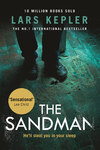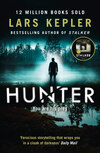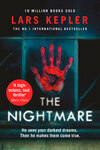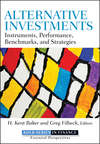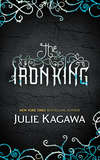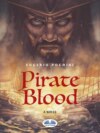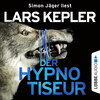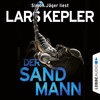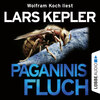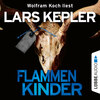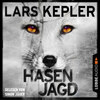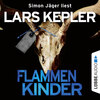Kitabı oku: «The Sandman», sayfa 4
12
A goods train is thundering through the nocturnal winter landscape. The Traxx train is pulling almost three hundred metres of wagons behind it.
In the driver’s cab sits Erik Johnsson. His hand is resting on the control. The noise from the engine and the rails is rhythmic and monotonous.
The snow seems to be rushing out of a tunnel of light formed by the two headlights. The rest is darkness.
As the train emerges from the broad curve around Vårsta, Erik Johnsson increases speed again.
He’s thinking that the snow is so bad that he’s going to have to stop at Hallsberg, if not before, to check the braking distance.
Far off in the haze two deer scamper off the rails and away across the white fields. They move through the snow with magical ease, and disappear into the night.
As the train approaches the long Igelsta Bridge, Erik thinks back to when Sissela sometimes used to accompany him on journeys. They would kiss in each tunnel and on every bridge. These days she refuses to miss a single yoga lesson.
He brakes gently, passes Hall and heads out across the high bridge. It feels like flying. The snow is swirling and twisting in the headlights, removing any sense of up and down.
The train is already in the middle of the bridge, high above the ice of Hallsfjärden, when Erik Johnsson sees a flickering shadow through the haze. There’s someone on the track. Erik sounds the horn and sees the figure take a long step to the right, onto the other track.
The train is approaching very fast. For half a second the man is caught in the light of the headlamps. He blinks. A young man with a dead face. His clothes are trembling on his skinny frame, and then he’s gone.
Erik isn’t conscious of the fact that he’s applied the brakes and that the whole train is slowing down. There’s a rumbling sound and the screech of metal, and he isn’t sure if he ran over the young man.
He’s shaking, and can feel adrenalin coursing through his body as he calls SOS Alarm.
‘I’m a train driver, I’ve just passed someone on the Igelsta Bridge … he was in the middle of the tracks, but I don’t think I hit him …’
‘Is anyone injured?’ the operator asks.
‘I don’t think I hit him, I only saw him for a few seconds.’
‘Where exactly did you see him?’
‘In the middle of the Igelsta Bridge.’
‘On the tracks?’
‘There’s nothing but tracks up here, it’s a fucking railway bridge …’
‘Was he standing still, or was he walking in a particular direction?’
‘I don’t know.’
‘My colleague is just alerting the police and ambulance in Södertälje. We’ll have to stop all rail traffic over the bridge.’
13
The emergency control room immediately dispatches police cars to both ends of the long bridge. Just nine minutes later the first car pulls off the Nyköping road with its lights flashing and makes its way up the narrow gravel track alongside Sydgatan. The road leads steeply upwards, and hasn’t been ploughed, and loose snow swirls up over the bonnet and windscreen.
The policemen leave the car at the end of the bridge and set out along the tracks with their torches on. It isn’t easy walking along the railway line. Cars are passing far below them on the motorway. The four railway tracks narrow to two, and stretch out across the industrial estates of Björkudden and the frozen inlet.
The first officer stops and points. Someone has clearly walked along the right-hand track ahead of them. The shaky beams of their torches illuminate some almost eradicated footprints and a few traces of blood.
They shine their torches into the distance, but there’s no one on the bridge as far as they can see. The lights of the harbour below make the snow between the tracks look like smoke from a fire.
Now the second police car reaches the other end of the deep ravine, more than two kilometres away.
The tyres thunder as Police Constable Jasim Muhammed pulls up alongside the railway line. His partner, Fredrik Mosskin, has just contacted their colleagues on the bridge over the radio.
The wind is making so much noise in the microphone that it’s almost impossible to hear the voice, but it’s clear that someone was walking across the railway bridge very recently.
The car stops and the headlights illuminate a steep rock face. Fredrik ends the call and stares blankly ahead of him.
‘What’s happening?’ Jasim asks.
‘Looks like he’s heading this way.’
‘What did they say about blood? Was there much blood?’
‘I didn’t hear.’
‘Let’s go and look,’ Jasim says, opening his door.
The blue lights play upon the snow-covered branches of the pine trees.
‘The ambulance is on its way,’ Fredrik says.
There’s no crust on the snow and Jasim sinks in up to his knees. He pulls out his torch and shines it towards the tracks. Fredrik is slipping on the verge, but keeps climbing.
‘What sort of animal has an extra arsehole in the middle of its back?’ Jasim asks.
‘I don’t know,’ Fredrik mutters.
There’s so much snow in the air that they can’t see the glow of their colleagues’ torches on the other side of the bridge.
‘A police horse,’ Jasim says.
‘What the …?’
‘That’s what my mother-in-law told the kids.’ Jasim grins, and heads up onto the bridge.
There are no footprints in the snow. Either the man is still on the bridge, or he’s jumped. The cables above them are whistling eerily. The ground beneath them falls away steeply.
The lights of Hall Prison are glowing through the haze, lit up like an underwater city.
Fredrik tries to contact their colleagues, but the radio just crackles.
They head slowly further out across the bridge. Fredrik is walking behind Jasim, a torch in his hand. Jasim can see his own shadow moving across the ground, swaying oddly from side to side.
It’s strange that their colleagues from the other side of the bridge aren’t visible.
When they are out above the frozen inlet the wind from the sea is bitter. Snow is blowing into their eyes. Their cheeks feel numb with cold.
Jasim screws up his eyes to look across the bridge. It disappears into swirling darkness. Suddenly he sees something at the edge of the light from the torch. A tall stick-figure with no head.
Jasim stumbles and reaches his hand out towards the low railing, and sees the snow fall fifty metres onto the ice.
His torch hits something and goes out.
His heart is beating hard and Jasim peers forward again, but can no longer see the figure.
Fredrik calls him back and he turns round. His partner is pointing at him, but it’s impossible to hear what he’s saying. He looks scared, and starts to fumble with the holster of his pistol, and Jasim realises that he’s trying to warn him, that he was pointing at someone behind his back.
He turns round and gasps for breath.
Someone is crawling along the track straight towards him. Jasim backs away and tries to draw his pistol. The figure gets to its feet and sways. It’s a young man. He’s staring at the policemen with empty eyes. His bearded face is thin, his cheekbones sharp. He’s swaying and seems to be having trouble breathing.
‘Half of me is still underground,’ he pants.
‘Are you injured?’
‘Who?’
The young man coughs and falls to his knees again.
‘What’s he saying?’ Fredrik asks, with one hand on his holstered service weapon.
‘Are you injured?’ Jasim asks again.
‘I don’t know, I can’t feel anything, I …’
‘Please, come with me.’
Jasim helps him up and sees that his right hand is covered with red ice.
‘I’m only half … The Sandman has taken … he’s taken half …’
14
The doors of the ambulance bay of Södermalm Hospital close. A red-cheeked auxiliary nurse helps the paramedics remove the stretcher and wheel it towards the emergency room.
‘We can’t find anything to identify him by, nothing …’
The patient is handed over to the triage nurse and taken into one of the treatment rooms. After checking his vital signs the nurse identifies the patient as triage-level orange, the second highest level, extremely urgent.
Four minutes later Dr Irma Goodwin comes into the treatment room and the nurse gives her a quick briefing:
‘Airways free, no acute trauma … but he’s got poor saturation, fever, signs of concussion and weak circulation.’
The doctor looks at the charts and goes over to the skinny man. His clothes have been cut open. His bony ribcage rises and falls with his rapid breathing.
‘Still no name?’
‘No.’
‘Give him oxygen.’
The young man lies with his eyelids closed and trembling as the nurse puts an oxygen mask on him.
He looks strangely malnourished, but there are no visible needle marks on his body. Irma has never seen anyone so white. The nurse checks his temperature from his ear again.
‘Thirty-nine point nine.’
Irma Goodwin ticks the tests she wants taken from the patient, then looks at him again. His chest rattles as he coughs weakly and opens his eyes briefly.
‘I don’t want to, I don’t want to,’ he whispers frantically. ‘I’ve got to go home, I’ve got to, I’ve got to …’
‘Where do you live? Can you tell me where you live?’
‘Which … which one of us?’ he asks, and gulps hard.
‘He’s delirious,’ the nurse says quietly.
‘Have you got any pain?’
‘Yes,’ he replies with a confused smile.
‘Can you tell me …’
‘No, no, no, no, she’s screaming inside me, I can’t bear it, I can’t, I …’
His eyes roll back, he coughs, and mutters something about porcelain fingers, then lies there gasping for breath.
Irma Goodwin decides to give the patient a Neurobion injection, antipyretics and an intravenous antibiotic, Benzylpenicillin, until the test results come back.
She leaves the treatment room and walks down the corridor, rubbing the place where her wedding ring sat for eighteen years until she flushed it down the toilet. Her husband had betrayed her for far too long for her to forgive him. It no longer hurts, but it still feels like a shame, a waste of their shared future. She wonders about phoning her daughter even though it’s late. Since the divorce she’s been much more anxious than before, and calls Mia far too often.
Through the door ahead of her she can hear the staff nurse talking on the phone. An ambulance is on its way in from a priority call. A serious RTA. The staff nurse is putting together an emergency team and calling a surgeon.
Irma Goodwin stops and goes back to the room containing the unidentified patient. The red-cheeked auxiliary nurse is helping the other nurse to clean a bleeding wound in the man’s thigh. It looks like the young man had run straight into a sharp branch.
Irma Goodwin stops in the doorway.
‘Add some Macrolide to the antibiotics,’ she says decisively. ‘One gram of Erythromycin, intravenous.’
The nurse looks up.
‘You think he’s got Legionnaires’ disease?’ she asks in surprise.
‘Let’s see what the test—’
Irma Goodwin falls silent as the patient’s body starts to jerk. She looks at his white face and sees him slowly open his eyes.
‘I’ve got to get home,’ he whispers. ‘My name is Mikael Kohler-Frost, and I’ve got to get home …’
‘Mikael Kohler-Frost,’ Irma says. ‘You’re in Södermalm Hospital, and—’
‘She’s screaming, all the time!’
Irma leaves the treatment room and half-runs to her office. She closes the door behind her, puts on her reading glasses, sits down at her computer and logs in. She can’t find him in the health service database and tries the national population register instead.
She finds him there.
Irma Goodwin unconsciously rubs the empty place on her ring finger and rereads the information about the patient in the emergency room.
Mikael Kohler-Frost has been dead for seven years, and is buried in Malsta cemetery, in the parish of Norrtälje.
15
Detective Inspector Joona Linna is in a small room whose walls and floor are made of bare concrete. He is on his knees while a man in camouflage is aiming a pistol at his head, a black SIG Sauer. The door is being guarded by a man who keeps his Belgian assault rifle trained on Joona the whole time.
On the floor next to the wall is a bottle of Coca-Cola. The light is coming from a ceiling lamp with a buckled aluminium shade.
A mobile phone buzzes. Before the man with the pistol answers he yells at Joona to lower his head.
The other man puts his finger on the trigger and moves a step closer.
The man with the pistol talks into the mobile phone, then listens, without taking his eyes off Joona. Grit crunches under his boots. He nods, says something else, then listens again.
After a while the man with the assault rifle sighs and sits down on the chair just inside the door.
Joona kneels there completely still. He is wearing jogging trousers and a white T-shirt that’s wet with sweat. The sleeves are tight across the muscles of his upper arms. He raises his head slightly. His eyes are as grey as polished granite.
The man with the pistol is talking excitedly into the phone, then he ends the call and seems to think for a few seconds before taking four quick steps forward and pressing the barrel of the pistol to Joona’s forehead.
‘I’m about to overpower you,’ Joona says amiably.
‘What?’
‘I had to wait,’ he explains. ‘Until I got the chance of direct physical contact.’
‘I’ve just received orders to execute you.’
‘Yes, the situation’s fairly acute, seeing as I have to get the pistol away from my face, and ideally use it within five seconds.’
‘How?’ the man by the door asks.
‘In order to catch him by surprise, I mustn’t react to any of his movements,’ Joona explains. ‘That’s why I’ve let him walk up, stop and take precisely two breaths. So I wait until he breathes out the second time before I—’
‘Why?’ the man with the pistol asks.
‘I gain a few hundredths of a second, because it’s practically impossible to do anything without first breathing in.’
‘But why the second breath in particular?’
‘Because it’s unexpectedly early and right at the middle of the most common countdown in the world: one, two, three …’
‘I get it.’ The man smiles, revealing a brown front tooth.
‘The first thing that’s going to move is my left hand,’ Joona explains to the surveillance camera up by the ceiling. ‘It’ll move up towards the barrel of the pistol and away from my face in one fluid movement. I need to grasp it, twist upwards and get to my feet, using his body as a shield. In a single movement. My hands need to prioritise the gun, but at the same time I need to observe the man with the assault rifle. Because as soon as I’ve got control of the pistol he’s the primary threat. I use my elbow against his chin and neck as many times as it takes to get control of the pistol, then I fire three shots and spin round and fire another three shots.’
The men in the room start again. The situation repeats. The man with the pistol gets his orders over the phone, hesitates, then walks up to Joona and pushes the barrel to his forehead. The man breathes out a second time and is just about to breathe in again to say something when Joona grabs the barrel of the pistol with his left hand.
The whole thing is remarkably surprising and quick, even though it was expected.
Joona knocks the gun aside, twisting it towards the ceiling in the same movement, and getting to his feet. He jabs his elbow into the man’s neck four times, takes the pistol and shoots the other man in the torso.
The three blank shots echo off the walls.
The first opponent is still staggering backwards when Joona spins round and shoots him in the chest.
He falls against the wall.
Joona walks over to the door, grabs the assault rifle and extra cartridge, then leaves the room.
16
The door hits the concrete wall hard and bounces back. Joona is changing the cartridge as he marches in. The eight people in the next room all take their eyes off the large screen and look at him.
‘Six and a half seconds to the first shot,’ one of them says.
‘That’s far too slow,’ Joona says.
‘But Markus would have let go of the pistol sooner if your elbow had actually hit him,’ a tall man with a shaved head says.
‘Yes, you would have won some time there,’ a female officer adds with a smile.
The scene is already repeating on the screen. Joona’s taut shoulder, the fluid movement forward, his eye lining up with the sights as the trigger is pulled.
‘Pretty damn impressive,’ the group commander says, setting his palms down on the table.
‘For a cop,’ Joona concludes.
They laugh, lean back, and the group commander scratches the tip of his nose as he blushes.
Joona Linna accepts a glass of water. He doesn’t yet know that what he fears most is about to flare up like a firestorm. He doesn’t yet have any idea of the little spark drifting towards the great lagoon of petrol.
Joona Linna is at Karlsborg Fortress to instruct the Special Operations Group in close combat. Not because he’s a trained instructor, but because he has more practical experience of the techniques they need to learn than just about anyone else in Sweden. When Joona was eighteen he did his military service at Karlsborg as a paratrooper, and was immediately recruited after basic training to a special unit for operations that couldn’t be solved by conventional forces or weaponry.
Although a long time has passed since he left the military to study at the Police Academy, he still has dreams about his time as a paratrooper. He’s back on the transport plane, listening to the deafening roar and staring out through the hydraulic hatch. The shadow of the plane moves over the pale water far below like a grey cross. In his dream he runs down the ramp and jumps out into the cold air, hears the whine of the cords, feels his harness jerk as his limbs are thrown forward when the parachute opens. The water approaches at great speed. The black inflatable boat is foaming against the waves far below.
Joona was trained in the Netherlands for effective close combat with knives, bayonets and pistols. He was taught to exploit changing situations and to use innovative techniques. These goal-orientated techniques were a specialised version of a system of close combat known by its Hebrew name, Krav Maga.
‘OK, we’ll take this situation as our starting point, and make it progressively harder as the day goes on,’ Joona says.
‘Like hitting two people with one bullet?’ The tall man with the shaved head grins.
‘Impossible,’ Joona says.
‘We heard that you did it,’ the woman says curiously.
‘Oh no.’ Joona smiles, running his hand through his untidy blond hair.
His phone rings in his inside pocket. He sees on the screen that it’s Nathan Pollock from the National Criminal Investigation Department. Nathan knows where Joona is, and would only call if it was important.
‘Excuse me,’ Joona says, then takes the call.
He drinks from the glass of water, and listens with a smile that slowly fades. Suddenly all the colour drains from his face.
‘Is Jurek Walter still locked up?’ he asks.
His hand is shaking so much that he has to put the glass down on the table.
17
Snow is swirling through the air as Joona runs out to his car and gets in. He drives straight across the large exercise yard where he trained as a teenager, takes the corner with the tyres crunching, and leaves the garrison.
His heart is beating hard and he’s still having trouble believing what Nathan told him. Beads of sweat have appeared on his forehead, and his hands won’t stop shaking.
He overtakes a convoy of articulated lorries on the E20 motorway just before Arboga. He has to hold the wheel with both hands because the drag from the lorries makes his car shake.
The whole time he can’t stop thinking about the phone call he received in the middle of his training session with the Special Operations Group.
Nathan Pollock’s voice was quite calm as he explained that Mikael Kohler-Frost was still alive.
Joona had been convinced that the boy and his younger sister were two of Jurek Walter’s many victims. Now Nathan was telling him that Mikael had been found by the police on a railway bridge in Södertälje, and had been taken to Södermalm Hospital.
Pollock had said that Mikael’s condition was serious, but not life-threatening. He hadn’t yet been questioned.
‘Is Jurek Walter still locked up?’ was Joona’s first question.
‘Yes, he’s still in solitary confinement,’ Pollock had replied.
‘You’re sure?’
‘Yes.’
‘What about the boy? How do you know it’s Mikael Kohler-Frost?’ Joona had asked.
‘Apparently he’s said his name several times. That’s as much as we know … and he’s the right age,’ Pollock had said. ‘Naturally, we’ve sent a saliva sample to the National Forensics Lab—’
‘But you haven’t informed his father?’
‘We have to try to get a DNA match before we do that, I mean, we can’t get this wrong …’
‘I’m on my way.’
